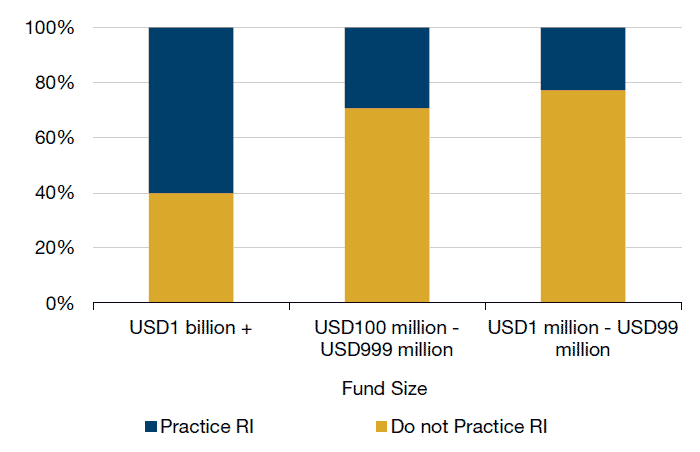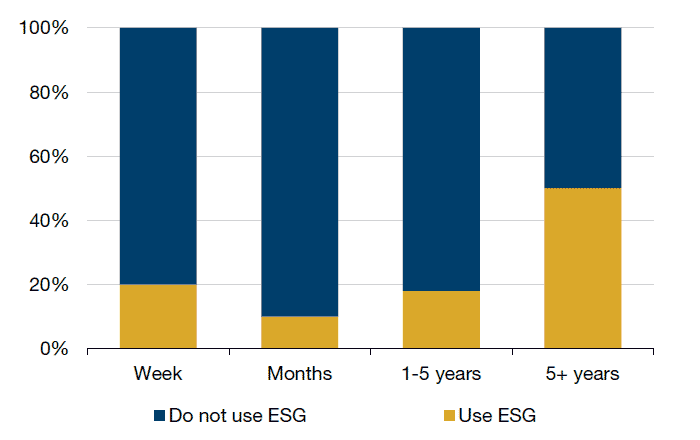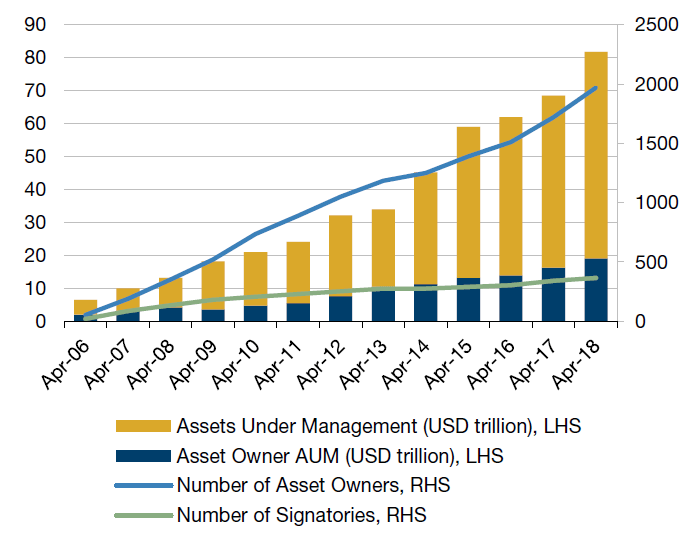The sustainability of hedge funds requires forward-thinking environmental practices. The sooner we embrace them, the better.
The sustainability of hedge funds requires forward-thinking environmental practices. The sooner we embrace them, the better.
February 2019
Introduction
Can hedge funds do good and do well at the same time?
As former US Vice President Al Gore puts it, “Outdated conceptions of fiduciary duty cannot be allowed to stand in the way of progress toward a better economic system. At stake is a low-carbon, prosperous, equitable, and healthy planet in which human civilization can flourish”.1 At Man GLG, we couldn’t agree more. Indeed, there are countless studies that demonstrate how hedge funds can do good and do well at the same time.
The more important questions, we believe, are how serious a hedge-fund firm is about responsible investment (‘RI’) – is it a box-ticking exercise, or is there a genuine culture of RI – and following that, how can a discretionary hedge fund successfully implement RI?
So, what is RI?
The United Nations-supported Principles for Responsible Investment agency (‘UN PRI’) defines RI as “an approach to investing that aims to incorporate environmental, social and governance (‘ESG’) factors into investment decisions, to better manage risk and generate long-term returns”.2
There are six ways to break down RI when making investment decisions:
- ESG investing: This typically examines companies based on each of the ‘E’, ‘S’ and ‘G’ factors;
- Sustainable investing: This typically focuses on specific sustainability measures e.g. clean energy or water;
- Socially responsible investing (‘SRI’): This typically uses negative/exclusionary screening, based on moral values;
- Ethical investing: Similar to SRI, this uses ethical screens to make investment decisions;
- Impact investing: Investing in companies that are making a positive impact on society and are increasingly aligned to the UN Sustainable Development Goals (‘SDGs’), alongside a financial gain;
- Thematic investing: Investing in sectors, themes and/or companies that are environmentally or socially conscious.
Demand on Hedge Funds to Pay Attention to RI is Growing
RI is going to play an increasingly important part of a discretionary hedge fund’s investment decisions, as both allocators of money and governments alike place more emphasis on the topic.
The EU, for example, wants asset managers and other financial firms to disclose how they account for sustainability risks when allocating capital.3 The UN, aiming to “better align investors with broader objectives of society,” has proposed a due dilligence questionnaire for hedge funds as it tries to enforce its six principles of RI.4 According to research from the Alternative Investment Management Association (‘AIMA’) and the Cayman Alternative Investment Summit (‘CAIS’), in May 2018, half of the 80 investment managers surveyed said that they had seen an increase in demand for RI from both current and prospective clients.
Figure 1. The UN Principles for Responsible Investment

Principle 1.
We will incorporate ESG issues into investment analysis and decision-making processes.

Principle 2.
We will be active owners and incorporate ESG issues into our ownership policies and practices.

Principle 3.
We will seek appropriate disclosure on ESG issues by the entities in which we invest.

Principle 4.
We will promote acceptance and implementation of the principles within the investment industry.

Principle 5. We will work together to enhance our effectiveness in implementing the principles.

Principle 6.
We will each report on our activities and progress towards implementing the principles.
However, even with this increased demand for RI, there isn’t much of an appetite by hedge funds to engage in RI. According to a recent survey by AIMA and CAIS, only 60% of hedge funds with more than USD1 billion in assets are engaged in RI.5 This ratio dropped dramatically for both hedge funds with less than USD100 million in assets and those with assets ranging from USD100 million and USD999 million.
Figure 2. Bigger Hedge Funds Are More Active in RI Than Smaller Counterparts. Survey Respondents Were Asked: ‘Do you engage in RI?’

Source: AIMA.6
The Opportunities of Implementing RI at Discretionary Hedge Funds
Traditionally, RI has been thought of something that long-only strategies can really implement. However, discretionary hedge funds that apply RI can do just as well, and we would argue even better, than long-only strategies.
1. The Ability to Go Short
One main reason why we believe discretionary hedge funds could do better than long-only strategies at implementing RI is because of discretionary hedge funds’ ability to go short the companies that are on the losing end of SRI or ESG factors.
2. Credit Opportunities
Governance is one of the most important factors to evaluate when investing in credit securities. Bondholders are looking to be repaid in full, and poor governance can easily jeopardize a company’s financial health, precipitating a rapid decline in the market price of the bonds and potentially impacting the final maturity and recovery value of the notes. Governance is also notoriously hard to score on an absolute basis or to model into traditional forward-looking credit metrics. At Man GLG, we tend to use a red-flag system where bond issuers that are flagged with poor governance are avoided. Rather than completely score every company we analyse across the full suite of ESG metrics, we flag companies that exhibit a potential ESG concern for further investigation to determine how severe the downside risk could be. Given that many of our funds can take short risk exposures, our investigation centers on whether or not we believe the concern is reflected in the bond’s price or if it has the potential to send the price significantly lower.
3. Activism
Discretionary hedge funds can be very active investors, which could result in positive outcomes if corporate engagement is done in a correct manner. In our experience, we have found that companies may be willing to have an open dialogue about where they need to improve on their ESG, SRI and/or sustainability metrics. It is, however, important to emphasize the importance of a fund’s investment time-horizon: a fund with a 5-year investment period, for example, may have more success when it comes to active management than a fund with a 3-month investment period. Indeed, it is widely acknowledged that ESG factors play a larger part in company analysis over longer time periods (Figure 3).
Figure 3. Hedge Funds Use More ESG Analysis if Investing Over a Longer Time Period

Source: 2017 Institutional Factor Survey. Bank of America Merrill Lynch US Equity and US Quant Strategy.
The Challenges of Implementing RI at Discretionary Hedge Funds
However, RI at discretionary hedge finds is certainly not without its challenges.
1. Grey Areas
There are certainly grey areas when it comes to RI: Different funds many have different criteria as to what constitutes a good SRI, ESG or sustainable company. Additionally, how should a portfolio manager invest if a company is strong on ‘E’, but poor on ‘S’? There is also the age-old debate about divestment versus engagement.
2. The Lack of Data
ESG data have matured over the last decade, and we are entering a phase where the data have both a long-enough history and broad-enough coverage to make it interesting to quantitative investment firms. However, ESG data are qualitative, discretionary and unregulated. Indeed, the ESG data we obtained by vendors typically have a short history and is often retroactively collected. This is an area in which Man Group is applying its skillset – to improve the collection and analysis of ESG data. We believe that by spending the time to understand the nuances of each vendor’s methodology and properly handling their data quirks can potentially lead to a unique, alpha-generating dataset.
Implementing RI in Practice
So, how can hedge funds implement RI in practice?
We believe the first and most important step is education, education, education: Portfolio managers need to own and embrace RI. To do that, education is required so that portfolio managers build an understanding of what clients expect and what it means to effectively integrate RI into the decision-making. Indeed, RI doesn’t have to be about ‘greening’ a portfolio, but rather weighing your portfolio toward companies that are proactively doing something about their sustainability issues.
Once portfolio managers understand the importance of RI, the next step is how to do the research on the companies. As mentioned earlier, a lack of data is definitely a challenge in implementing RI. However, this is improving: sell-side brokers started integrating ESG factors into research more than 15 years ago.7 Of the world's largest 250 corporations, 93% report on their sustainability performance.8 More than 80% of S&P 500 companies now report on ESG metrics compared with one in five in 2011, according to research from Axioma.9 Since the launch of the Global Reporting Initiative in 2000, 82% of the world’s largest company use GRI standards to do so.8 More recently, the International Integrated Reporting Initiative and the US-based Sustainability Accounting Standard Board have helped to improve industry sector-specific reporting in an effort to make it more relevant to investors. Finally, there are the aforementioned third-party service providers that rate companies based on how sustainable they are. Hence, portfolio managers do have a breadth of tools available to them when conducting research and analysis as it pertains to sustainability.
After decisions are made on which securities should be included in the portfolio – either as longs or shorts – discretionary portfolio managers have the ability to actively engage with corporate management to assess firm governance and potentially drive change. While corporate engagement is already a key part of the process of many discretionary portfolio managers, we believe portfolio managers should embrace active stewardship such as proxy voting. Larger hedge-fund firms tend to either have their own in-house stewardship teams or outsource this function.
In assessing stewardship activities at Man Group, we took a hard look at where our strengths and weaknesses lay and found that there was an over-reliance on service providers. This forced us to ask how we could make better decisions in proxy voting, especially as it related to RI. As a result, Man Group is in the process of developing an in-house stewardship team. The aim is that while we had previously been quite reactive when it came to stewardship, having an in-house team will help allow us to become more proactive.
Last but not least, quantifying responsible investment is key. Portfolio managers should be able to provide visibility on RI dynamics across portfolios. This could be as specific as metrics on carbon footprints across a fund’s portfolio, or as broad as exclusion lists.
What Should Asset Owners Look Out For?
We believe the first thing asset owners should look out for is whether the hedge-fund firm is a signatory to the UN PRI. This is being increasingly expected from hedge-fund firms, as illustrated by the growth of signatories in Figure 4.
Figure 4. Growth in UN PRI Signatories

Source: AIMA, as of April 2018.10
Once a firm has demonstrated a high-level commitment to RI, it may be worth digging a little deeper. RI at discretionary hedge funds can range from ESG analysis tacked on as an overlay to fundamental analysis, to ESG analysis being embedded into the fundamental analysis. If an asset owner is really passionate about RI, we believe it should take the time to really understand the discretionary hedge fund’s culture: portfolio managers must be able to demonstrate their commitment to sustainability, and be able to clearly explain how they incorporate RI into their portfolio construction.
We stress the ‘fund’ versus ‘firm’ here – It is quite difficult at firms with many funds to have a ‘one-size-fits-all’ approach. While there may be an overriding theme at a firm, different funds’ approaches may vary depending on the needs and interests of that fund’s clients, managers and strategy.
For example, Man Group has implemented a new RI Fund Framework, designed to establish a baseline requirement of ESG standards, and to provide credibility, clarity and consistency in Man Group’s approach to RI across its range of funds. There will be three categories into which all funds will fall: the base standard; a standard for funds with a further level of RI integration; and a standard for RI-dedicated funds. Under this framework, Man Group has formalised its mandatory, firm-wide exclusion policy on ownership of positions in companies that participate in controversial arms and munitions across all of its funds. In addition, Man Group is also introducing an RI Exclusions List, designating sectors that will be excluded from Man Group’s RI-integrated or RI-dedicated funds. The proprietary list of excluded sectors is in line with international standards and global consensus, and includes:
- Controversial weapons – companies involved in the production of anti-personnel mines, cluster munitions, chemical, biological weapons, depleted uranium weapons or nuclear weapons;
- Tobacco – companies that are involved in the production of tobacco or are suppliers of significant components of cigarettes;
- Production of coal and coal-based energy – companies where the production of coal or provision of coal-based energy represents more than 30% of revenues.
A final point assets owners should bear in mind is greenwashing, or the act of appearing to be ‘greener’ than the reality. It would be worth really doing the due diligence to determine whether RI is just a box-ticking exercise, or whether RI is really embedded in the fund’s culture.
Conclusion
As RI becomes increasingly important to asset owners, governments and society in general, discretionary portfolio managers need to own and embrace ESG integration. At Man Group, our approach is to develop a ‘toolkit’ for portfolio managers to make it as easy as possible for them to integrate RI in to their existing process. After all, the long-term sustainability of the hedge-fund business requires forward-thinking environmental practices. The sooner we embrace it, the better.
1. http://www.unpri.org/Uploads/u/j/z/Fiduciary-duty---progress-report-2017.pdf
2. http://www.unpri.org/about-the-pri/what-is-responsible-investment/317.article
3. http://europa.eu/rapid/press-release_IP-18-3729_en.htm
4. http://www.unpri.org/pri/what-are-the-principles-for-responsible-investment
5. AIMA and CAIS collected 80 survey responses from hedge fund firms representing approximately $550 billion in total assets under management. Survey responses were collected from December 2017 to February 2018, and the results were published in June 2018.
6. From Niche to Mainstream: Responsible Investment and Hedge Funds
7. https://www.unpri.org/listed-equity/esg-integration-in-sell-side-equities-research/16.article
8. https://www.globalreporting.org/information/news-and-press-center/press-resources/Pages/default.aspx
9. https://www.ft.com/content/f99b0399-ee67-3497-98ff-eed4b04cfde5
10. https://www.aima.org/article/esg-integration-on-the-rise-and-how-to-implement-it-in-your-portfolio.html
You are now exiting our website
Please be aware that you are now exiting the Man Institute | Man Group website. Links to our social media pages are provided only as a reference and courtesy to our users. Man Institute | Man Group has no control over such pages, does not recommend or endorse any opinions or non-Man Institute | Man Group related information or content of such sites and makes no warranties as to their content. Man Institute | Man Group assumes no liability for non Man Institute | Man Group related information contained in social media pages. Please note that the social media sites may have different terms of use, privacy and/or security policy from Man Institute | Man Group.